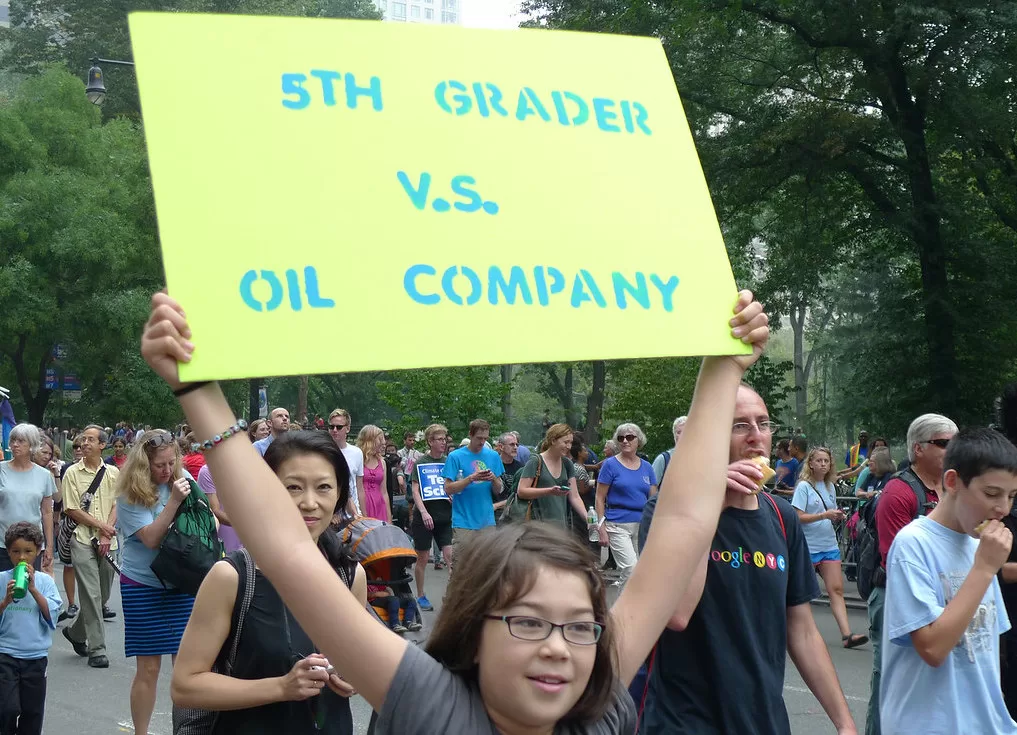
“I’m being arrested for exercising my First Amendment right to protest, because Joe Manchin is putting a 300-mile-long pipeline through my home state of West Virginia, and President Biden allowed him to do it, for nothing in return. He has sold us out.” —Rylee Haug, Climate Defiance organizer
Editor’s Note: This story was originally published by Democracy Now and can be viewed at https://www.democracynow.org/2023/9/19/climate_week_biden
As climate activists from around the world gather in New York for the annual Climate Week, which coincides with the new session of the United Nations General Assembly, an estimated 75,000 people marched on the U.N. headquarters Sunday with a demand for President Biden to “end fossil fuels.” They escalated their demands by targeting financing for fossil fuel projects, with a series of direct actions at major U.S. financial institutions and the Federal Reserve Bank of New York. We get an update from two of the protest organizers: Renata Pumarol, with Climate Defenders, and Alicé Nascimento, campaign director at New York Communities for Change, who was arrested at Monday’s protest. “Climate chaos is not in some distant future,” says Pumarol. “It will only get worse if we do not stop the fossil fuel industry, and the only way to stop the fossil fuel industry is to stop the financing of fossil fuels.”
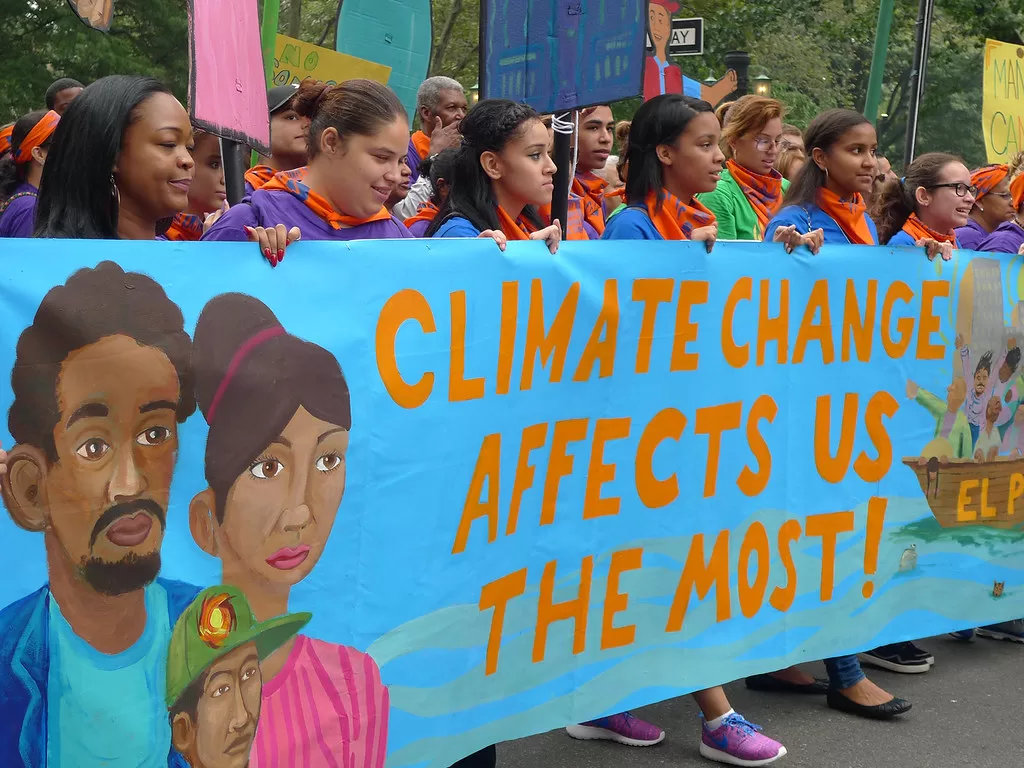
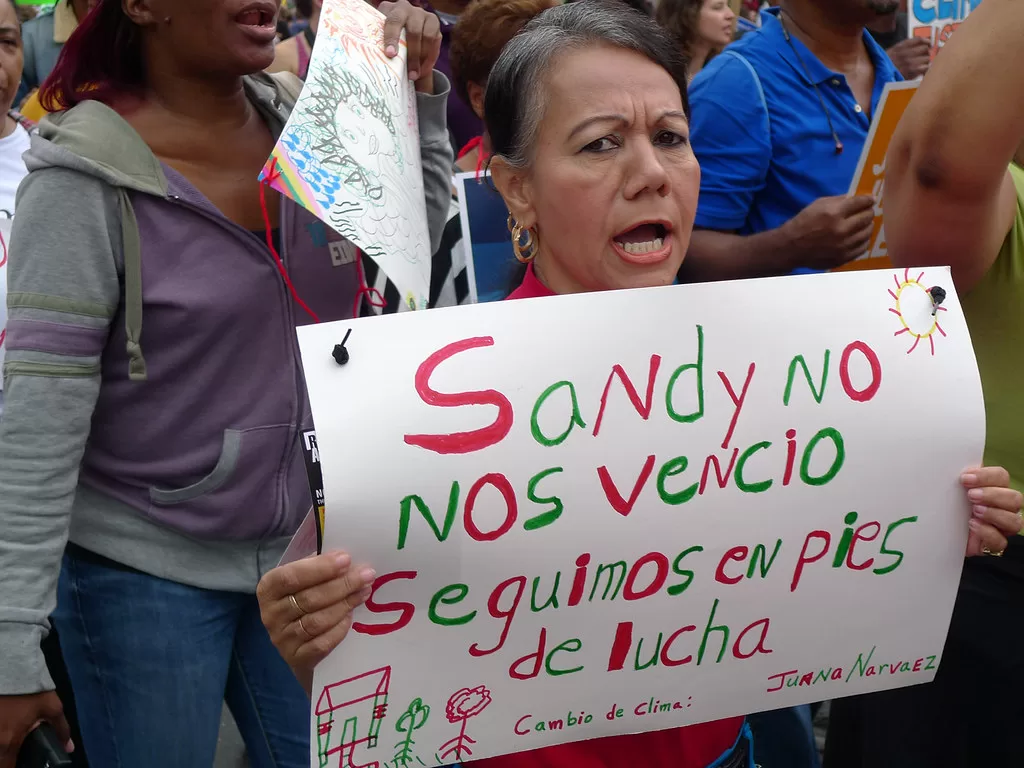
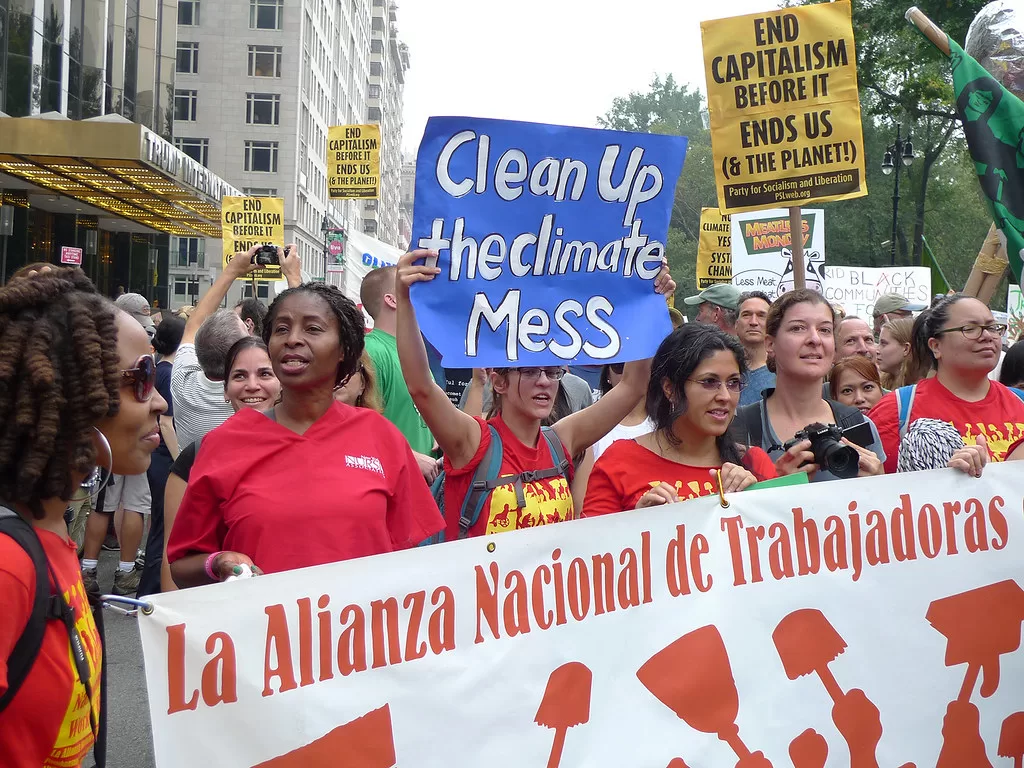
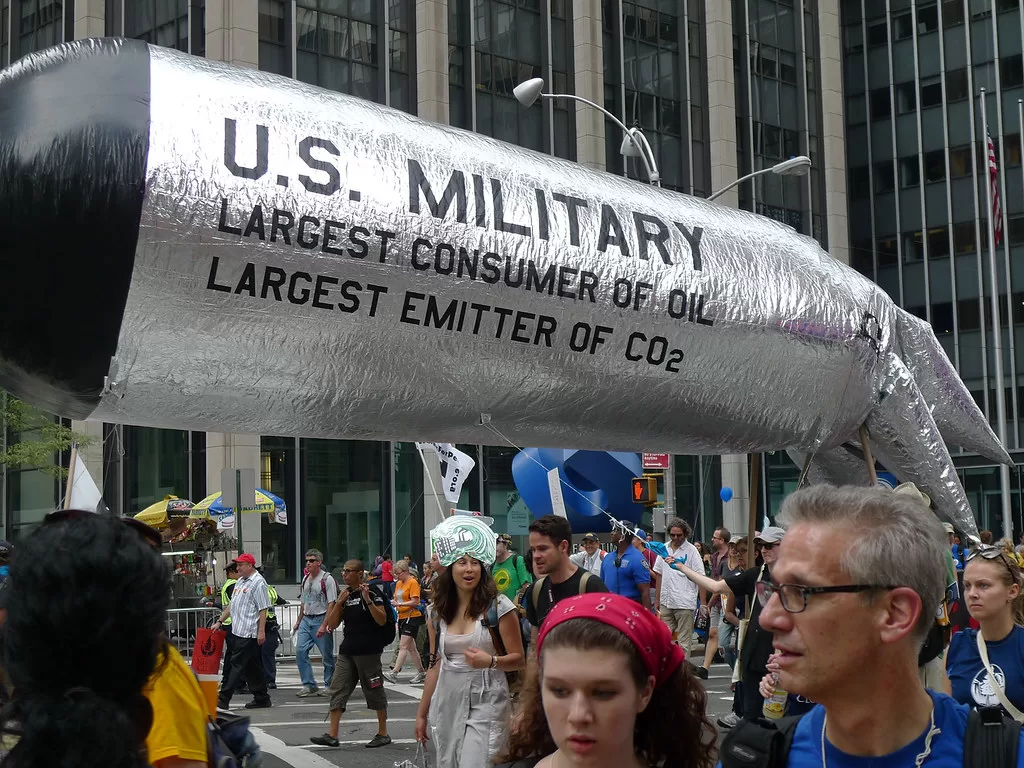
Transcript
This is a rush transcript. Copy may not be in its final form.
AMY GOODMAN: This is Democracy Now! I’m Amy Goodman, with Juan González.
As the U.N. General Assembly brings world leaders to New York this week, some will attend the first-ever Climate Ambition Summit Wednesday, focused on efforts to accelerate and address the climate — to address the climate crisis. President Biden speaks today at the General Assembly but will not attend the climate summit.
This comes after an estimated 75,000 people marched to the United Nations Sunday to demand Biden end fossil fuels. On Monday, activists escalated calls for climate action with one of the largest acts of civil disobedience in a decade. They gathered in Zuccotti Park, the former site of Occupy Wall Street, then surrounded the Federal Reserve Bank, blockading the entrances as they called for an end to the financing of fossil fuel projects. Organizers say 149 were arrested, including Climate Defiance organizer Rylee Haught.
RYLEE HAUGHT: I’m being arrested for exercising my First Amendment right to protest, because Joe Manchin is putting a 300-mile-long pipeline through my home state of West Virginia, and President Biden allowed him to do it, for nothing in return. He has sold us out. He promised to end drilling on federal lands. That’s a promise he made to all of us. And he’s selling out Appalachians’ futures for profit. He’s selling us out. And we’re going to drown in dirty water and dirty air.
AMY GOODMAN: This comes as climate protests targeted Citibank and AIG last week for funding fossil fuel projects, and today focus on Bank of America, which the Rainforest Action Network says has poured $279 billion into the fossil fuel industry since the 2015 Paris Agreement to reduce global greenhouse gas emissions.
For more, we’re joined by Renata Pumarol, organizer with Climate Defenders, one of the groups that’s been planning this week’s climate change direct action in New York City, and Alicé Nascimento, the campaign director at New York Communities for Change. She was arrested during the protest Monday at the Federal Reserve.
We welcome you both. Alicé, let’s start with you. Talk about why you got arrested yesterday. Talk about the Federal Reserve here in New York.
ALICÉ NASCIMENTO: Thank you, Amy, first. Thank you so much for having me.
I, you know, unlike many of my colleagues who blocked the doors yesterday to the Federal Reserve and put their bodies on the line, I was actually not planning to be arrested. I simply grabbed a bullhorn, and I contextualized where we were, as a number of our colleagues were getting arrested. And I called out the Fed for its responsibility to regulate climate risk as financial risk, and also the responsibility of our elected officials, especially Democrats, and financial regulators and their utter failure in this time of crisis.
And the police told me that I could not use a bullhorn, in spite of the fact that we were all using bullhorns, and that if I continued on speaking out, that they would arrest me. And I continued on speaking out, because it’s important. And then they proceeded to arrest me.
So, it came as a surprise. But at the same time, it’s what — you know, we’re really trying to bring the urgency of the crisis to the folks who are responsible for it. And the Fed is really failing in its role — not just its role, but really its duty and responsibility, to make sure that banks are no longer financing new fossil fuel infrastructure.
JUAN GONZÁLEZ: And I’d like to bring Renata Pumarol into the conversation. Renata, you participated in the protest. The recent protests have targeted financial institutions like Citibank and BlackRock. Why them?
RENATA PUMAROL: Well, BlackRock and Citibank are one of the biggest funders of fossil fuels. Citibank is actually the second-largest fossil fuel financier in the world and has poured over $333 billion into fossil fuels, and therefore are complicit in the climate chaos that we are experiencing.
Your audience know that, you know, climate chaos is not in some distant future. We are facing unprecedented heat waves and floods and fires that have killed tens of thousands of people. And it will only get worse if we do not stop the fossil fuel industry. And the only way to stop the fossil fuel industry is to stop the financing of fossil fuels.
And that’s why this week hundreds of activists targeted the financiers of fossil fuels, like BlackRock, like KKR and Citibank, and today Bank of America. These are the people who are funding the pipelines that are destroying Indigenous communities and threatening our water. They are the ones who are funding petrochemical facilities in Black and Brown communities and causing high rates of cancer and of asthma. And they are ultimately responsible for climate change and climate chaos, that is threatening our existence and are threatening, you know, a livable future.
JUAN GONZÁLEZ: And could you talk about how your own relatives in northeast Brazil are being impacted by the climate catastrophe?
RENATA PUMAROL: So, actually, this is — I think this question is meant for Alicé, who is from Brazil.
JUAN GONZÁLEZ: Oh, I’m sorry. Yes.
RENATA PUMAROL: I’m from Dominican Republic.
JUAN GONZÁLEZ: Oh, I’m sorry.
RENATA PUMAROL: No worries. I’m from Dominican Republic, though. And as you know, from the Caribbean, Caribbean islands are highly threatened by climate change. We have experienced, like, stronger hurricanes, you know, in the case of Puerto Rico, which was devastated by Hurricane Maria. And we are also facing unprecedented heat waves, too. And I’ll take it back to Alicé to talk about Brazil and how her country has been affected.
ALICÉ NASCIMENTO: Yeah.
AMY GOODMAN: Alicé, if you could respond in Brazil?
ALICÉ NASCIMENTO: Absolutely. I mean, as many of you know, of course, Brazil is really at the forefront in the battle to save our planet, with having the Amazon rainforest there and the Indigenous communities really not only fighting for their lives, but fighting for the future of our planet in protecting the Amazon, since they’re all technically considered protected lands under Brazil’s Constitution. So, that’s really the only thing that’s maintaining that underdeveloped and not — and decreasing the levels of deforestation, now that Lula has become president.
But for me, personally, I’m from the northeast of Brazil, Salvador, Bahia. It’s very right, right by the equator. It’s a city that’s right by the beach. And increasingly, you know, in the winters, there is rainy season. And it always rains, but now it’s just become — there are so many floods. My father’s house, recently his roof completely collapsed. And this is really the impacts of climate change. It’s something that we’re used to seeing rain in Brazil, but not to this degree. And, of course, it impacts everyone, but particularly the folks who are on the frontlines, who are poor and don’t necessarily have the means to rebuild their house or to have shelter.
AMY GOODMAN: Finally, Renata, this comes after 75,000 people marched. The focus was President Biden — “Biden, end fossil fuels,” the banner across the stage. Why President Biden? We have 20 seconds.
ALICÉ NASCIMENTO: Well, Biden, you know, of course, is the president of the United States, the most powerful country. It’s also the biggest producer of oil and gas. And Biden can stop new fossil fuel projects right now and has chosen not to do so, and has chosen actually even not to attend the climate summit and commit himself to stop —
AMY GOODMAN: We’re going to leave it there, but we’re going to continue to cover the climate actions across the week, Renata Pumarol and Alicé Nascimento. I’m Amy Goodman, with Juan González. Thanks for joining us.
The original content of this program is licensed under a Creative Commons Attribution-Noncommercial-No Derivative Works 3.0 United States License.
